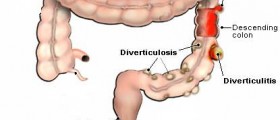
Crohn's disease is a chronic inflammatory condition that affects different parts of the gastrointestinal tact and occurs in a form of flare-ups. Typical characteristics of Crohn's disease are abdominal pain/cramping, diarrhea and weight loss. As it has been mentioned each and every part of the gastrointestinal tract can be affected by this inflammatory disease. However, the most commonly affected regions are the small intestine (particularly the ileum) and the large intestine (the colon). Once the condition fully develops, the affected part of the gastrointestinal tract gets inflamed, red and covered with ulcerations. Healing of these ulcers is accompanied by scarring which, in some cases, may be quite intensive and narrow the lumen of the organ and cause obstruction.
Crohn's Disease Causes
The actual cause of this inflammatory condition has not been identified yet. However, people who have a family history of the disease are more susceptible and highly likely to develop the disease themselves. In majority of cases the first symptoms and signs of Crohn's disease develop between the age of 20 and 30.
Crohn's Disease Clinical Characteristics
It is possible for symptoms and signs to vary a bit depending on the location of inflammatory changes. The severity also depends on the extent of inflammation i.e. the amount of the gastrointestinal tract affected.
Patients whose symptoms are mild generally do not report the problem to their doctors and this is why the condition can remain undiagnosed for a certain period of time.
Moderate Crohn's disease is characterized by mild fever, blood in the stool and pain in the abdomen. Furthermore, there is a loss of appetite and consequent unintentional weight loss.
More severe forms are the cause of intensive abdominal pain, bloody diarrhea. They also may be accompanied by boils and fistulas.
Diagnosing Crohn's Disease
After investigating patient's medical history and performing physical exam, doctor needs to perform several more tests in order to set definitive diagnosis of Crohn's disease. These include blood samples, stool specimens, endoscopic examination of the gastrointestinal tract and X-ray studies. After taking biopsy of the affected tissues and its microscopic examination, the diagnosis can be 100% confirmed.
Crohn's Disease Treatment
Treatment for Crohn's disease depends on the severity of inflammation, the extent of damage and potential complications. Patients are basically prescribed medications which reduce inflammation and bring symptoms of the disease under control. Surgery is an option only in case of serious damage to the gastrointestinal tract and it additionally deals with some complications. During severe attacks patients are always hospitalized.
The most common drugs prescribed to people suffering from Crohn's disease are aminosalicylates and corticosteroids. In severe form of the disease which do not react to corticosteroids patients receive immunosuppressants (azathioprine, Cyclosporine etc). If there is secondary bacterial infections, patients also receive antibiotics. Vitamin and mineral supplements are required in case of their deficiency. And finally, severe diarrhea requires antidiarrheals.
Crohn's Disease Complications
This inflammatory condition is associated with different complications some of which are quite serious. Due to prolonged bleeding patients may end up with iron deficiency anemia. Some of them also develop ileus or intestinal obstruction. Perforation or formation of fistulas is two more potential problems. Finally, the disease can additionally induce liver inflammation, inflammation of joints and eyes and skin rash.

















Your thoughts on this
Loading...